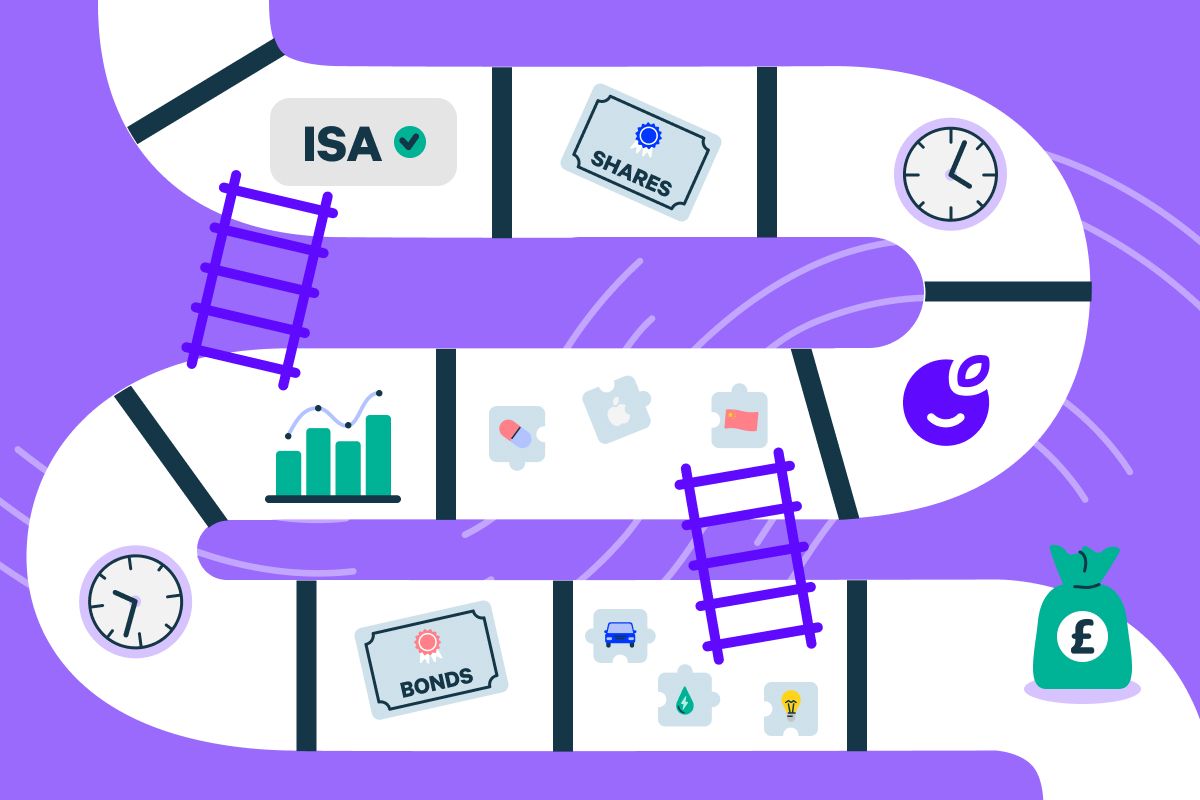For many of us, the media portrayals of Wall Street traders can make the world of investing seem entirely alien... and perhaps also a little unsavoury 👽
Despite the stereotypes, here at Plum we feel it’s important to remember that there’s more to the practice of investing than the excesses of that lifestyle.
In fact, we want to actively promote the potential benefits that investing can offer and make sure it’s available to everyone who wants the opportunity to grow their money for the future 🌱
So no matter whether you're a new investor or you're still just thinking about taking the plunge, our beginner’s guide to investing covers all you need to know about the stock market and beyond!
Investing for Everyone 👨👩👧👦
When we created Plum, we wanted to put investing into the hands of everyday people (i.e. people who may not be able to afford a personal wealth manager).
If you have a large amount of money to invest, then it may be worth paying for some bespoke financial advice. For everyone else though, whether you’re just getting to grips with personal finance or you’re already working on a retirement plan… you’ll soon be thinking like Warren Buffett 🎩 (A guy who was pretty good at this investing thing!)
What is an Investment? 🤷♂️
Before we get in too deep, it’s probably worth clarifying exactly what we mean by an ‘investment’ to begin with! To invest money means to acquire something with it in the hope of achieving a gain (as opposed to a loss), or ‘return’ in finance speak, at some point in the future 🔭
It’s a pretty complex topic, and obviously there’s much more to it than that… but at a basic level that’s what you need to understand.
Should I Start Investing? ⏰
Before we launch into the ‘how’ of investing, it’s sensible to consider for a moment whether this is actually the right time for you to invest. Investing should be a long-term decision, and not one to be entered into until you’re certain that all your other priorities are in order.
All immediate, high-interest debt (such as credit cards) should be paid-off in full before investing money. You should also have an emergency fund tucked away in a savings account to cover any essential living expenses should something unforeseen happen (e.g. you lose your job) 🔮
Your emergency fund should be easily accessible and separate to your investment portfolio. Interest rates tend to be relatively low for a standard, flexible bank account, but the money is protected by the Financial Services Compensation Scheme and is guaranteed not to decrease in face-value.
You can also be sure of immediate access to your money in a standard current account, whereas with an investment it can take a little time to sell the asset, which could be at a profit or a loss, and transfer the money back to you.
Investing for the Long-Term 📆
Whatever your investment goals, the aim is to make your money work for you.
When looking at the type of investment that's right for you, most often it will come down to how soon you think you might need to access the money. It is not unusual for stock-market pros to think in terms of fifteen year cycles… and the last thing you want is to be selling your investment in the trough of an unforeseen low 📉
The flip-side of this is the level of risk you’re comfortable with 🎲 This will often be closely linked to the longevity of an investment, and will ultimately dictate your potential investment returns too.
By thinking about your own financial situation, you can consider any likely contingencies in the short, medium, and long terms. Paying into a retirement account is something that your future self will likely thank you for, but not if you lose some (or potentially all) of the value of your investment because you are forced to draw down the money early at an unfavourable time 🤦♂️
What Are the Types of Investment? 📊
The definition of an investment is quite broad, so this isn’t intended to be an exhaustive list. We’ve put together a list of the types of investment you should know about if you’re planning to start investing. Our Plummunity Forum has more detail on many of these topics!
To start, there are a few broad terms that we should clarify...
Bonds
When you invest in a bond, you’re effectively lending money. There are different types, like government bonds, or corporate bonds (i.e. loaning money to a government or business). Bonds are referred to as a "fixed-interest" asset, because they will include a set rate of return over a specific period of time ⏱
Generally speaking, bonds are considered less risky than stocks & shares as they are supposed to return your money (plus the specified interest rate). Though they are often thought to be more secure than shares, they're not risk free. It’s not even unheard of for governments to default on bond payments, in desperate times.
Though bonds can be considered more secure than shares, the trade-off is that the return is capped ✋ If you invest in stocks and shares your returns are potentially unlimited… but in the worst case you could lose everything. We'll talk more about diversification later...
Stocks & Shares
A share is a part of a business. You will often hear the terms ‘stocks’ and ‘shares’ used interchangeably, but they are slightly different. When a company wants to offer part of the business for sale on the markets, it issues stock. An investor can then buy shares (units) of that stock 🧀
Shares are broadly considered to be more high risk than bonds, for example, because stock can fluctuate in value. While shares can offer a higher rate of return than bonds, there is no guaranteed rate of return. The value of your investment could go down as well as up 📉 As the mantra goes!
Individual Savings Accounts (ISA)
When looking at investment options, first time investors should start with some type of ISA. In the UK, everyone is given an annual allowance providing income tax relief from on any gains earned through their ISA. An ISA is really just a package for a type of investment. There are several different ISAs, but here are the two most common varieties.
Cash ISA
This is basically a tax-free savings account (i.e. you won’t pay tax on interest earned within the annual allowance) 💰 The rate of return will often be linked to the amount of time it takes the ISA to ‘mature’ (when you access your money), and the severity of penalties for early withdrawal.
Stocks & Shares ISA
A tax efficient investment account that offers relief from dividend tax and capital gains tax. A stocks and shares ISA will allow you to select between a range of different investment options, including individual shares or bonds, and investment trusts / investment funds.
Whilst an ISA can be a great way to start investing, there are limits to how much you can deposit within any given (tax) year.
You can invest all your allowance into one or more Stocks and Shares ISAs or spread it across your different ISA accounts, but you must stay within the overall annual £20,000 limit. The UK tax year runs from April 6th to April 5th in the following calendar year.
Funds
The next thing that any new investor should acquaint themselves with is the concept of ‘funds’. Broadly speaking, a fund is an investment vehicle 🚘 An entity that allows investors to effectively pool resources in order to capitalise on the advantages of operating as a group.
The main benefit of funds is that they are heavily diversified. The term, ‘diversification’, is an important one, and one you should familiarise yourself with. The principle is that your portfolio should contain a mixture of lots of different types of investments.
We diversify to help protect ourselves from poor performance in a particular geography or industry. On the extreme end of the scale, it can be risky to put an investment in a single place, or buy shares in a single company! In short… don’t carry all your eggs in one basket 🐣
Mutual Funds
A mutual fund is a professionally managed portfolio typically containing some combination of bonds and shares. They are often put together by fund managers, around a theme such as asset class (e.g. technology shares) or risk-level (e.g. high-growth companies).
Exchange-Traded Funds (ETFs)
An ETF is a type of ‘Index Fund’. An Index Fund is a collection of securities that are indexed against a particular financial market, such as the S&P 500. The name comes from the fact that, unlike mutual funds (which are just traded at the end of each day), ETFs are bought-and-sold on an exchange, just like individual stock 📈
Of course, there are many ways to invest your money. Here we’ve tried to focus on the methods deemed most appropriate for new investors, or even first-time investors. Alternatively, you could choose to invest your money in something entirely different, like property / real estate, art, vintage cars, or even wine… so to some extent you’re only limited by your own imagination 🤯
The Mechanics of How to Invest ⚙️
Historically, if you wanted to invest then you might rely on a traditional wealth manager… the type of person who spends their days watching share prices 🤓
Nowadays, technology has stepped-in to help people invest too. Robo-advisors can now perform many of the same functions... at a fraction of the cost! And their robo-advice is still tailored to you, though now in a slightly different way (i.e. formed as a result of analysing your personal data). The result is a more level playing field, with the knock-on impact that the minimum starting investment amount needed to cover fees has also been reduced 🙌
When deciding which method of investing is right for you, the most immediate choice you need to make is the platform you wish to use i.e. the investment app or website you’ll use to buy or sell investments 📲 Ease of use will obviously be an important factor when evaluating this, but the underlying fees and ‘cost’ of the investments can make a huge difference to your returns.
When looking at investment fees, there are two aspects to consider. Firstly, the price you pay to use the investment platform (i.e. any subscription fees), and secondly the management fees for the specific investments you choose.
Final Thoughts 🤔
When starting out into the world of investing, it’s best to acquire as much knowledge as possible and to apply it by starting early!
As part of a considered strategy, investing at an early age allows you to take advantage of compounding (the process where any returns are reinvested along with the original stake). This is a powerful force. The multiplying effect of compounding is so surprising that even Albert Einstein is quoted as having described it as “the eighth Wonder of the World”. High praise indeed 🙏
Our final word though must go to diversification. Historically, a well diversified portfolio, left untouched over a long enough period of time, could be a sure-fire way to make your money work for you. But then again, past performance is not a reliable indicator of future results 😏
Remember, your capital is at risk if you invest.
If you’d like to learn how Plum can help you invest then check out our website!
Download PlumFor all the latest Plum news and discussion, keep an eye on our Facebook group, Plum Squad, or follow us on Instagram and Twitter.

